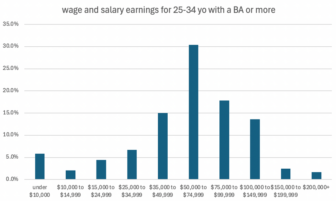
I am a long-time fan of Kettering University. Particularly their integration of learning and work with their one semester at school followed by one semester working in the industry the student is preparing for.
Having said that I could not disagree more with Kettering’s President Robert McMahan when he says in a Bridge interview:
At the end of the day, the value of what we’re doing is being defined externally, and the market is signaling to us that they do not (value a traditional college experience). What we are doing is increasingly not relevant. We are not supplying them (companies) with what they need. And that is going to drive a wholesale disruption of the higher education industry in the United States.
All of the evidence is that the market is signalling that college is relevant. That a four-year degree is the most reliable path to both a good-paying first job and forty-year career.
We find that the two best easily accessible data sources on the question of the value of a four-year degree, and particularly for recent graduates, are a Census Bureau table of Current Population Survey data on work earnings by age and education attainment and a report from the Federal Reserve Bank of St. Louis entitled: The Financial Returns from College across Generations: Large but Unequal. Which looks at both income and net wealth (so it includes student loan debt as a subtraction from net wealth).
(We have done posts on both. On 2018 CPS data for 25-34 year olds here. And on the Fed report here.)
In addition, there is Harvard’s David Deming’s work using American Community Survey data on earnings by degree that shows that by age 40 liberal arts majors earn as much as STEM majors. Because employers value/promote those with broader,so-called soft-skills rather than occupation specific skills. He summarizes his findings in a New York Times op ed entitled In the Salary Race, Engineers Sprint but English Majors Endure.
Maybe the most important reality is that the work earnings premium, using the CPS data, is larger for 35-44 years old than it is for 25-34 year olds. So let’s assume employers are dopes and they over pay for the four-year degree credential in hiring for first jobs. That they could get the same or better skills for entry-level professional jobs if they didn’t screen for a four–year degree. If that were true the wage premium for 35-44 year old college grads should go down, not up. Employers in terms of who gets a raise and who gets promoted are doing so on the basis of performance, not credentials.
But the exact opposite happens: the median work earnings premium for a four-year degree goes from $17,000 to $25,000 compared to those with a two-year degree where the wage premium is the narrowest. The increased median wage premium as you get on in your career, almost certainly, is a reflection that the skills you developed earning a BA are of value in work performance.
Combined the CPS data, the Fed data and the Deming analysis add up to you work more, you earn more, and you have higher net worth if you get a four-year degree. That the market is in fact signalling that college is relevant.
There is no guaranteed path to good-paying jobs and careers. Yes there are recent college graduates who are struggling economically. Of 25-34 year olds with a four-year degree or more 18 percent had total money earnings from work of less than $30,000. But for those 25-34 year olds without a four-year degree 46 percent had total money earnings from work of less than $30,000. To us the data are clear: the most reliable path to a good-paying jobs and careers is a four-year degree in any major.
That is today, What about tomorrow? Clearly none of us know what the future will bring in terms of jobs and returns on a four-year degree. But lots of evidence points in the direction that the skills that will matter most to a successful forty-year career are the kind of skills that are built in college liberal arts courses, no matter what occupation you choose as a first job.
That is because as Google found the skills that most define their successful employees are so-called soft skills: being a good coach; communicating and listening well; possessing insights into others (including others different values and points of view); having empathy toward and being supportive of one’s colleagues; being a good critical thinker and problem solver; and being able to make connections across complex ideas.
Sure seems like to us that President McMahan does not have the market on his side when he says “What we (colleges) are doing is increasingly not relevant”. To us the data from the labor market are clear: college is relevant.








